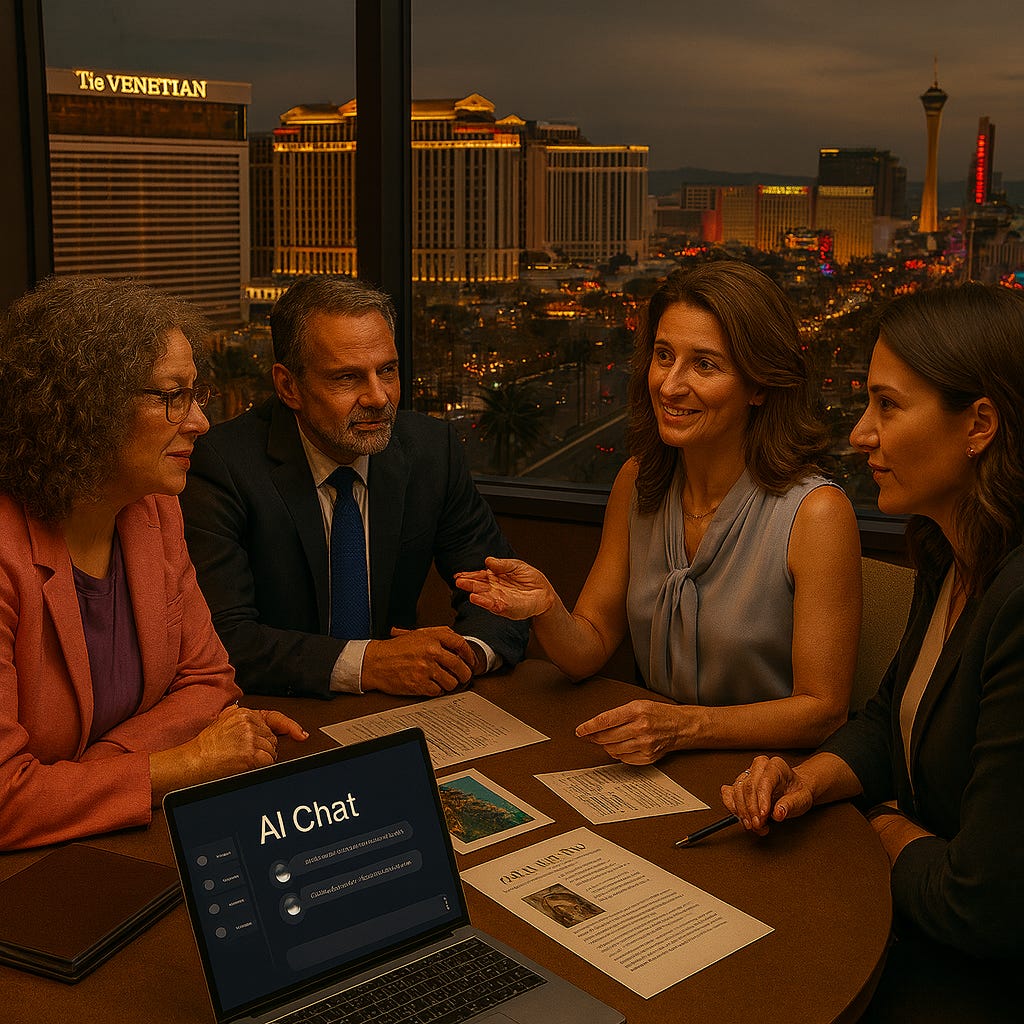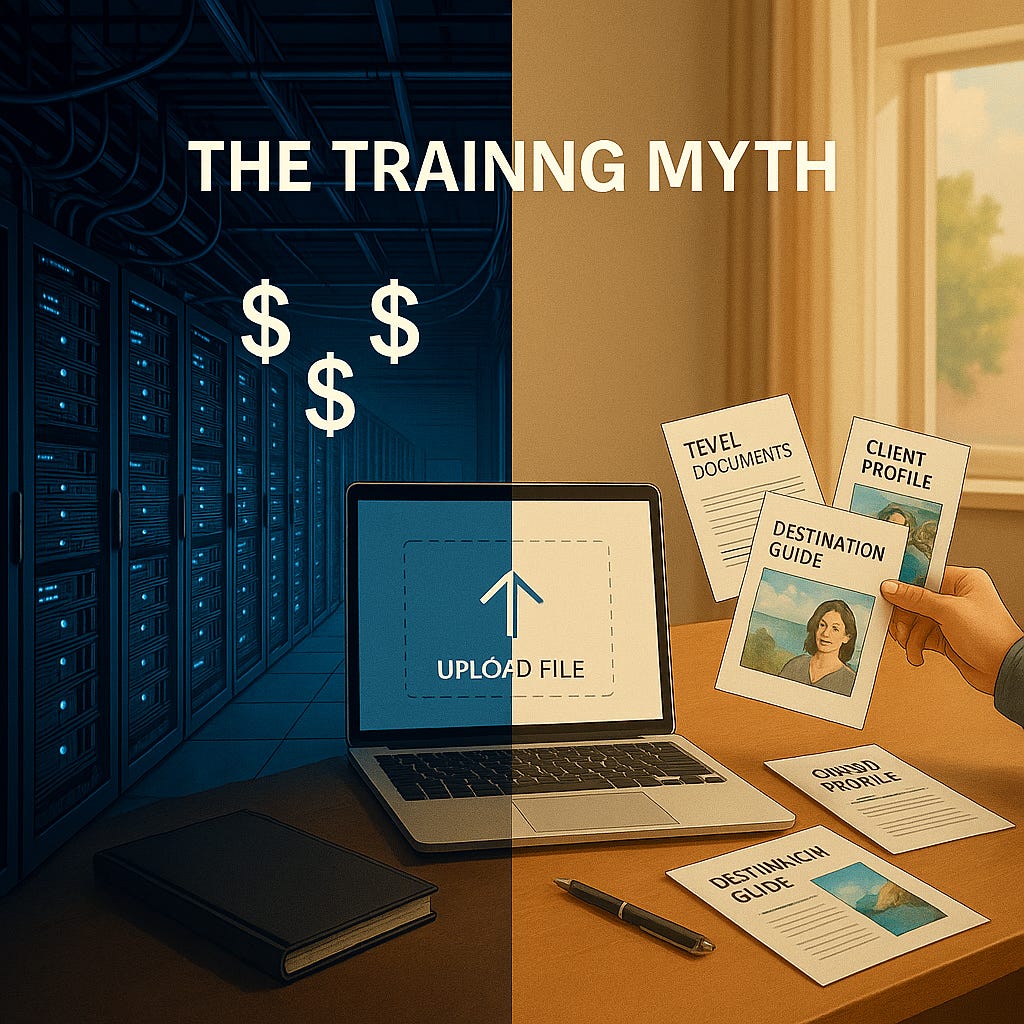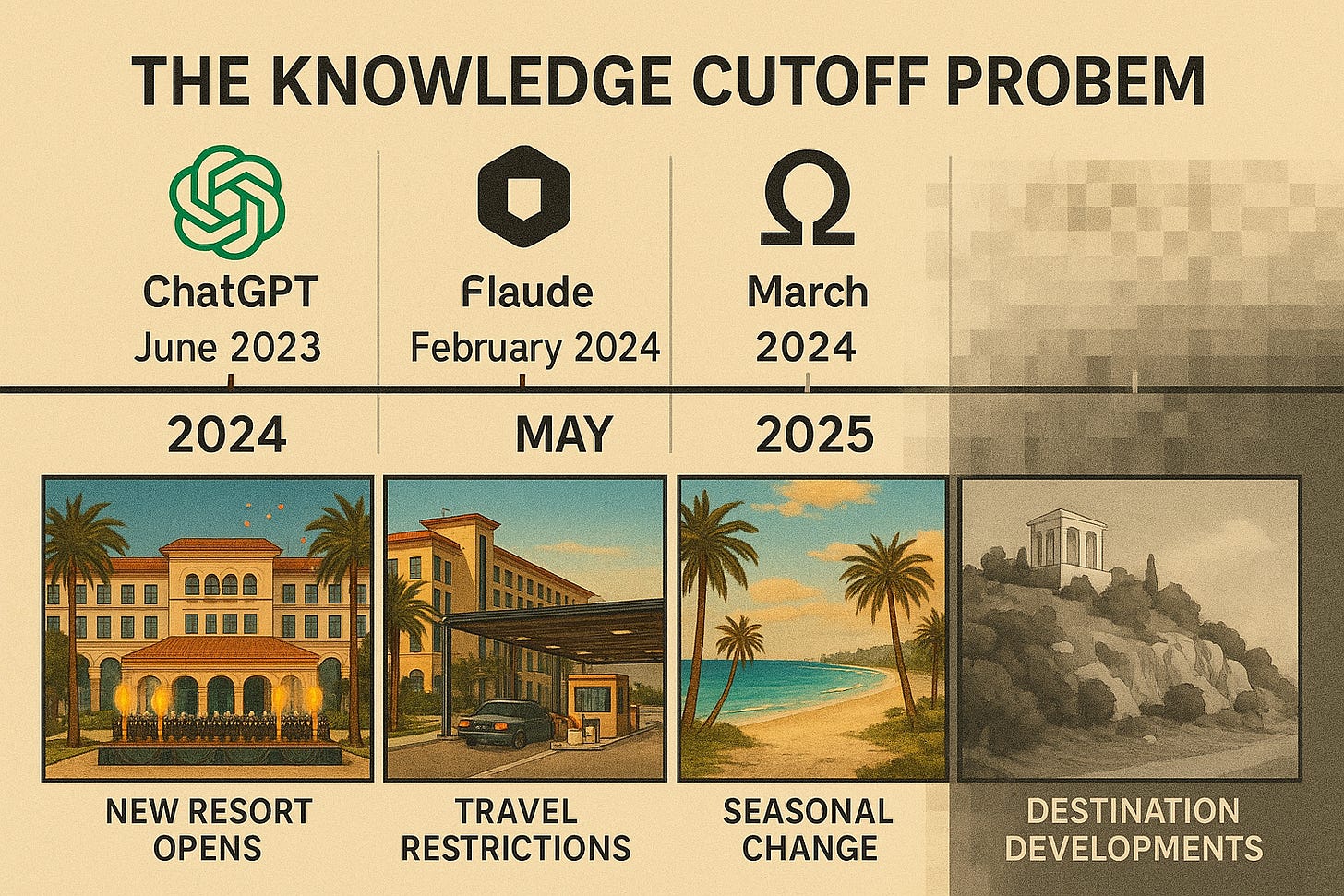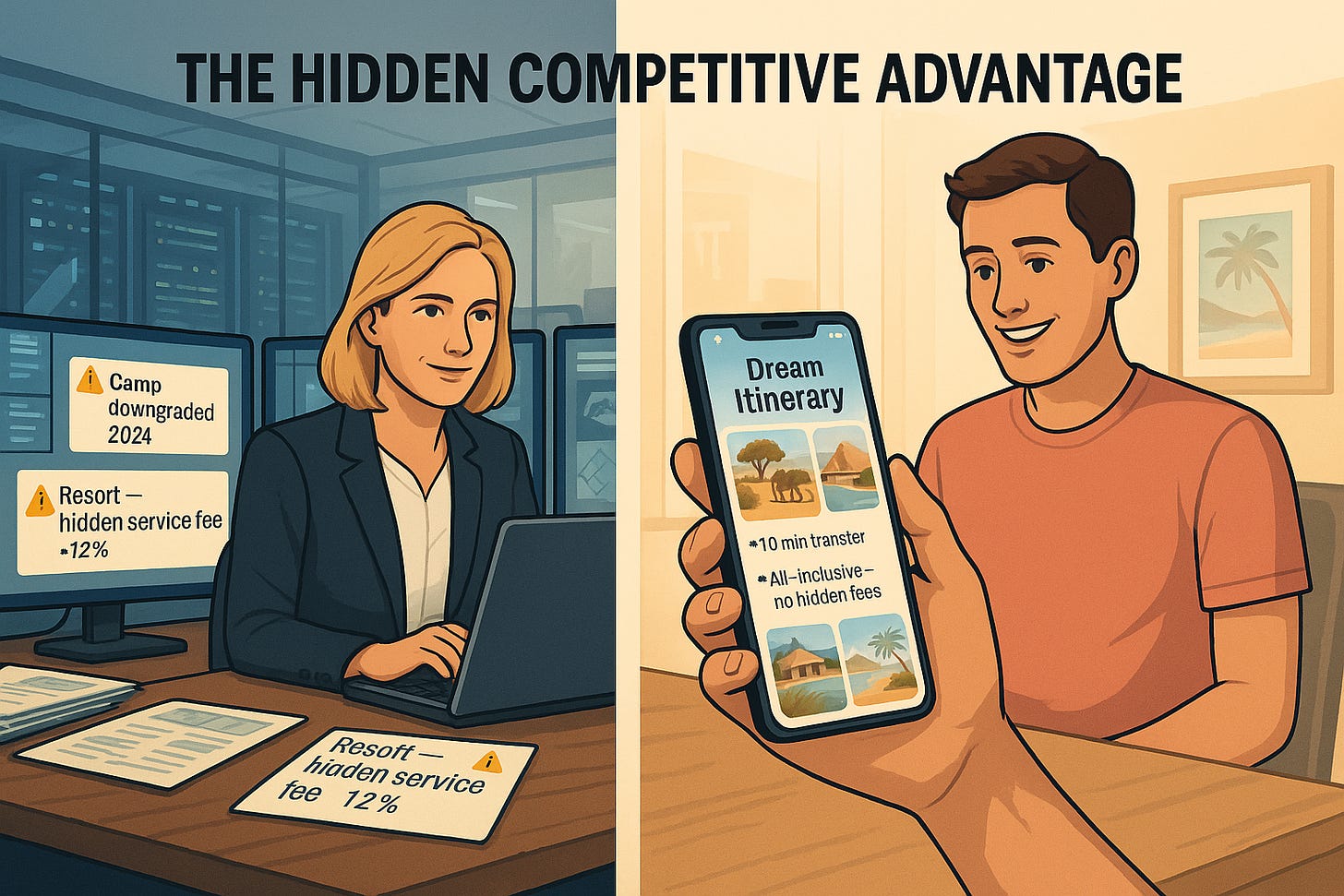I spent Saturday morning at a table with some of the travel industry's most successful operators at the Virtuoso Technology Summit in Las Vegas—advisors who've built multi-million dollar practices, owners of luxury agencies, and specialists who command five-figure planning fees. These aren't people struggling with technology adoption. They're sophisticated business operators looking for competitive advantage.
What struck me wasn't their eagerness to adopt AI—that was expected. It was the fundamental disconnect between what they think AI can do and what it actually does.
The Model Training Myth
"We're training our own model on our client data," one advisor told me confidently.
No, you're not.
This was the most persistent misconception I encountered. Elite operators throw around "training" like they're building custom neural networks in their back offices. What they're actually doing is prompt engineering with context injection. Training a model costs tens of millions of dollars—third-party estimates place GPT-4's training around $80-100M. Even fine-tuning requires specialized infrastructure and costs thousands to tens of thousands depending on data volume.
What these operators want is RAG—Retrieval Augmented Generation. Feed your client profiles and destination knowledge into a system that can search and retrieve relevant context, then generate responses based on that information. That's what I showed them with Claude Projects: upload your knowledge base and let the AI search through it to generate personalized content.
The distinction determines whether you'll succeed. You're not training a model; you're organizing knowledge for retrieval.
The Information Problem
Another advisor asked me how to get ChatGPT to know about her latest Bhutan offerings that launched last month.
Here's what most operators miss: These models aren't databases. Their training data has specific cutoffs—Claude Sonnet 4 uses January 2025, GPT-4 varies by version, and GPT-5's knowledge cutoff is September 30, 2024—surprisingly old for such a recent release. That exclusive new resort you're selling? The AI has never heard of it.
"But it seems to know current things sometimes," another advisor protested.
That's because some ChatGPT interfaces can search the web, or because older information seems current. The model itself remains frozen in time.
Stop thinking of AI as a database to query. Think of it as an interface for interacting with information. It's not about what AI "knows"—it's about what AI can help you organize, retrieve, and communicate.
The Discovery Challenge
The conversation that revealed the real disconnect: "How do I get ChatGPT to recommend my new Bhutan offerings when someone asks about luxury Himalayan travel?"
This is the fundamental challenge small operators face: They want to be found when potential customers use AI for travel research.
One vendor at Virtuoso was selling services to get travel marketing data into the Common Crawl, one of the datasets used to train some models. For smaller operations, this offers low predictability and long lag times. Even if your data makes it into the next training run, it would be so diluted among trillions of tokens that it might as well not exist.
The harsh reality? As of August 2025, most mainstream chat assistants either rely on general web search or do not guarantee inclusion of specific business content. When someone asks Claude or ChatGPT about African safaris, it won't know about your exclusive camps that opened last month.
The best current workaround remains traditional SEO, since some AI tools can search the web. But the promise of AI discovering and recommending your specific offerings remains largely unfulfilled for small operators in 2025.
The ChatGPT Lock-In
Even after I demonstrated Claude's expanded capacity for document storage—Projects can handle substantially more files versus ChatGPT's varying file limits—several advisors remained skeptical about switching.
"But all my clients know ChatGPT," one said.
This is OpenAI's notable success: brand attachment in a commodity market. People stick with ChatGPT not because it's better, but because it feels familiar and established.
For business operations, it's costly. Claude's Projects feature changes what's possible with larger-scale knowledge management. One advisor had been manually copying client preferences into every GPT conversation. With Claude Projects, those preferences persist automatically.
The difference becomes stark at scale. Twenty clients with detailed profiles, destination research, supplier contracts, and communication history? That's potentially hundreds of documents. ChatGPT's file handling becomes constrained. Claude Projects handles it at scale.
The Hidden Competitive Advantage
Here's what I didn't say at the table but became clear: These operators are sitting on a goldmine they don't recognize—their insider knowledge that doesn't exist anywhere online.
Every elite operator knows things ChatGPT will never know. Which "luxury" camps have deteriorated but still trade on old reputations. The real transfer times between locations during rainy season. Which exclusive properties actually have availability versus those booked two years out. The suppliers who deliver versus those who consistently disappoint.
This proprietary knowledge becomes weaponized when properly organized. Set up a Claude Project with your insider intelligence—every supplier evaluation, seasonal variation, logistics reality, and hard-won lesson. When a potential client shows you an AI-generated itinerary they found online, you can run it through YOUR AI assistant that actually knows the truth.
"Your ChatGPT itinerary looks beautiful," you can say, "but let me show you why it won't work." Your Claude, armed with real data, will instantly identify that the suggested camp closes in March, the "2-hour scenic drive" is actually 7 hours on unpaved roads, and the "hidden gem restaurant" has been closed since 2023.
You're not being negative, you're demonstrating irreplaceable expertise. The generic AI gave them a fantasy. You're offering reality, refined by decades of experience that no public model can access.
Implementation Path
For elite operators ready to move beyond misconceptions:
Start with Claude Pro and upload your knowledge base—client profiles, destination guides, supplier agreements. But more importantly, document your secrets: the camps that photograph well but disappoint in person, the real logistics that no website mentions, the seasonal realities that marketing materials ignore.
Set up Perplexity Tasks to monitor your specialties with scheduled searches. Use Granola to capture client interactions.
Use metaprompting: Don't write prompts—have AI write them for you. Use voice tools like SuperWhisper to brain dump what you want, then feed that to Claude with: "Turn this into a clear, structured prompt for an AI assistant."
Build evaluation workflows. Never send AI output without review. Use one AI to create, another to verify. Domain expertise remains essential.
The Real Opportunity
The Virtuoso Technology Summit revealed a travel industry eager for AI transformation but confused about what that transformation looks like. The gap between perception and reality is creating two classes of operators: those who understand these tools as sophisticated pattern matchers and information organizers, and those still believing in training myths.
The winners won't be the ones who "train their own models" or get their marketing data into training datasets. They'll be the ones who accept AI for what it is—excellent pattern recognition and retrieval systems—and build workflows that leverage that reality.
For travel advisors: Stop trying to make AI into something it isn't. Start making your existing expertise scalable through intelligent information organization. The competitive advantage isn't in the technology—it's in understanding the technology accurately enough to use it effectively.
The insights in this article come from my session at the Virtuoso Technology Summit in Las Vegas on August 9, 2025, where we discussed practical AI implementation for luxury travel businesses.






